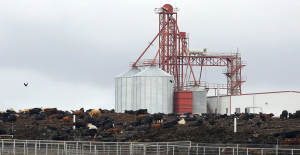In the Eastern District of Washington, rancher Cody Allen Easterday was sentenced to serve 11 years in federal prison for a “ghost cattle” defrauding of Tyson Foods Inc. and another company to the tune of more than $244 million. According to the U.S. Department of Justice, Easterday’s fraud scheme was the largest the district has ever seen.
“The Criminal Division is committed to holding those who carry out fraudulent schemes accountable, especially those that are complex, long-running, and seriously affect our nation’s food industry and commodities market,” said Assistant Attorney General Kenneth A. Polite, Jr. of the Justice Department’s Criminal Division.
In March 2021, Easterday pleaded guilty to wire fraud for the charges on approximately 265,000 head of cattle that simply did not exist, according to the Department of Justice’s news release. Chief Judge Bastian ordered Easterday to pay $244,031,132 in restitution and has imposed a three-year period of supervised release after he is out of federal prison.
»Related: Cattle and pot used to raise $650M in Ponzi-style scheme
At Easterday’s sentencing, Bastian remarked, this case involves “the biggest theft or fraud I’ve seen in my career — and the biggest I ever hope to see.” He further said to Easterday that “you destroyed” the very “empire you spent so much time building. It all came to a collapse because of what you have done.”
According to court documents and information from court proceedings, Easterday and his business, Easterday Ranches Inc., entered into an agreement with Tyson Foods and another company agreeing to purchase and feed cattle on behalf of these companies. Under the agreement, the companies advanced Easterday Ranches’ cost of purchasing and raising cattle. Easterday Ranches was to repay the cost advanced plus interest and other costs after cattle were slaughtered and sold at market prices.
Over a period of approximately four years, Easterday and his company collected the “ghost cattle” and millions for the purported costs of purchasing and raising 265,000 head of non-existent animals.
The funds Easterday collected were used to offset $200 million in losses that he incurred from commodity trading on behalf of Easterday Ranches. In connection with these losses, Easterday also defrauded the CME Group Inc. by submitting false paperwork which exempted Easterday Ranches from position limits in live cattle futures contracts.
The remainder of stolen funds was used for Easterday’s personal benefit, including the expansion of the Easterday farming empire, which by 2020 included over 22,000 acres of farmland, 150 employees, revenues of over $250 million, and a private plane and hangar.

Vanessa Waldref, the U.S. Attorney for the Eastern District of Washington, stated, “No one is above the law. Mr. Easterday amassed significant personal wealth, yet, he wanted more, so he defrauded his victims of nearly a quarter billion dollars by charging for cattle that never existed.” She continued, “But for the combined and incredible efforts of our law enforcement team, today’s sentence and the $240,000,00-restitution award — one of the largest in our District’s history — would not have been possible. Fraud has a debilitating impact on society by draining our communities’ limited resources. Accordingly, we will continue to prosecute fraudsters to the fullest extent so we can keep our communities safe and strong in Washington State and throughout our great Nation.”
Shortly after Easterday’s massive fraud was uncovered, Easterday Ranches and another of his companies, Easterday Farms Inc., went into bankruptcy. Over the following year and a half, Easterday’s companies and their assets, including large amounts of real property, heavy farm equipment, and even aircraft, were liquidated in one of the largest bankruptcy cases in Eastern Washington history. Through the bankruptcy proceedings, the victim companies were able to recover approximately $65 million.
“The scale and brazenness of Mr. Easterday’s fraud is immense,” said Assistant U.S. Attorney Brian M. Donovan, who handled restitution and bankruptcy proceedings on behalf of the United States. “The amount he stole — nearly a quarter of a billion dollars — would have funded the combined police, courts, and fire department budget of Yakima, which is a city of nearly 100,000 people, for more than four years. Mr. Easterday’s greed destroyed his family’s farming empire and harmed innocent victims.”


